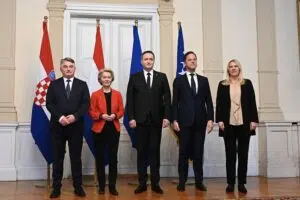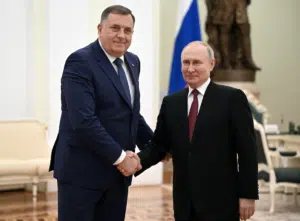Brussels – After a breakthrough European Council meeting, the next one should be decisive. Bosnia and Herzegovina’s hopes of seeing EU accession negotiations begin all depend on the outcome of the summit of heads of state and government of the 27 member countries scheduled for March 21-22, based on a report that the European Commission is drafting on the candidate’s progress for this crucial milestone on the path to membership. “A single, united, and sovereign country: that is our common goal for Bosnia and Herzegovina in the EU. We will present the report by March and the European Council will discuss on the basis of this report,” European Commission President Ursula von der Leyen made clear at a press point in Sarajevo during her trip together with the prime ministers of Croatia Andrej Plenković, and the Netherlands Mark Rutte.
“We have discussed the next steps. We need to see progress” on key chapters, the head of the EU executive explained this morning (January 23), “The more you deliver…the more you help me to produce a report that reflects this movement forward.” The reference is to the December European Council decision to start accession negotiations with Sarajevo “once the necessary degree of compliance with the accession criteria is achieved.” In parallel, work on the Western Balkans Growth Plan also continues, and – after von der Leyen’s veiled threats during the last trip to Sarajevo on the redistribution of resources to the other Balkan partners in case of failure to implement reforms – there were assurances that “we have designed the Plan so that no other country can block it, it is only your decision.”
Returning to the issue of the start of EU accession negotiations, Bosnia and Herzegovina’s Chairwoman of the Council of Ministers, Borjana Krišto, wanted to illustrate the commitment of the national authorities with both “ongoing legislative work on 13 draft laws” and a “program of reforms through 2024.” In Sarajevo, “there is optimism” that “in March there will be a date to start negotiations,” Krišto stressed, receiving confirmation from Croatian Prime Minister Plenković: “The report should help us find consensus on a positive decision. Use this window of opportunity to push the reforms to be included in the report.” The Croatian leader, however, ended up at the center of controversy in the national public opinion for deserting the meeting with the three members of the Bosnia and Herzegovina presidency, in controversy over the presence of the Croat-Bosnian representative, Željko Komšić (not considered legitimate by Zagreb). Proof that Croatia is not one of the leading EU member countries without interest in the EU enlargement process, because it has a parallel nationalist game.

In any case, PM Plenković’s at the press conference spoke of a particularly urgent issue for the entire Union. “If we miss the opportunity [to start the EU accession negotiations, ed.] in March, we will lose the rest of the year, and we will almost certainly end up in January 2025,” he warned two months before the 27 leaders’ meeting: “In two months, the European election campaign will begin, and then the new institutions will have to take office.” A prediction not ruled out by von der Leyen, whose intentions to run for the presidency of the EU executive are still unknown: “After March, the year will be full of issues such as elections and the new configuration of the Parliament and the Commission.” Without putting the brakes on Sarajevo’s chances of aspiring to the start of accession negotiations as soon as possible, Dutch Prime Minister Rutte was nonetheless keen to reiterate that “all criteria must be met. In the current situation, one has to admit that there is still a lot of work to be done, but we are all willing to help.”
Bosnia and Herzegovina’s EU accession path
Bosnia and Herzegovina’s journey towards the European Union began on February 15, 2016, with the official filing of its membership application. For more than six years, no positive response came from EU institutions because of the country’s near-disastrous situation on the basic conditions (Copenaghen criteria) for being considered a formal candidate. However, over the past two years, signs of confidence have intensified, especially from the EU executive and its president, even given the risks of Russian destabilization of a very delicate country and region in the heart of Europe.
 Therefore, at the presentation of the 2022 Enlargement Package, the Commission recommended to the Council to grant Bosnia and Herzegovina candidate status for EU membership, accompanied by a particularly passionate speech in Sarajevo by von der Leyen during her trip to the Balkan capitals to announce Brussels’ strong support. After assessing the Commission’s opinion, the December 15, 2022, EU Leaders’ Summit approved granting Bosnia and Herzegovina the status of candidate country for EU membership while emphasizing the need to implement crucial reforms in the areas of rule of law, fundamental rights, strengthening of democratic institutions and public administration.
Therefore, at the presentation of the 2022 Enlargement Package, the Commission recommended to the Council to grant Bosnia and Herzegovina candidate status for EU membership, accompanied by a particularly passionate speech in Sarajevo by von der Leyen during her trip to the Balkan capitals to announce Brussels’ strong support. After assessing the Commission’s opinion, the December 15, 2022, EU Leaders’ Summit approved granting Bosnia and Herzegovina the status of candidate country for EU membership while emphasizing the need to implement crucial reforms in the areas of rule of law, fundamental rights, strengthening of democratic institutions and public administration.
After becoming the eighth candidate country for accession in the EU enlargement process, Bosnia and Herzegovina has continued to push on its path to the Union. Thanks to the (albeit limited) progress made by Brussels in the 2023 Enlargement Package, the EU Commission decided to include a recommendation to the European Council to launch accession negotiations for Sarajevo “once the necessary degree of compliance with the accession criteria has been achieved.” In other words, the recommendation is there, but it was already a foregone conclusion that the response of the leaders’ summit would be to wait for new positive news on the 14 priorities outlined by the Commission (of which only two were completed). At the last European Council in December, it went exactly like this, with the decision to start negotiations with Bosnia and Herzegovina, but without indicating a starting date. That is why the March 21-22 summit is considered decisive, even given the agenda in Brussels – electoral first and institutional later – in the remaining nine months of the year.
The Republika Srpska hurdle
Yet the path of Bosnia and Herzegovina’s rapprochement with the Union is made particularly difficult by the president of Republika Srpska Milorad Dodik, who has championed a secessionist project from October 2021. The goal is to remove itself from central state control in such areas as the military, tax system, and judiciary, more than 20 years after the end of the ethnic war in Bosnia and Herzegovina. The European Parliament has called for economic sanctions. After the condemnation of secessionist attempts by the Serb majority in Bosnia (with a bill to establish an autonomous High Judicial Council), Bosnian leaders gathered in Brussels in mid-June 2022 to sign a paper for stability and peace, focused primarily on electoral and constitutional reforms in the Balkan country.

However, concerns have increased since late March 2023, when the government of the Bosnian Serb entity presented a draft law to establish a registry of foreign-funded associations and foundations. The ‘foreign agents’ law is similar to the one adopted by Moscow in December 2022 and was approved in late September by the Banka Luka National Assembly, with open criticism from Brussels.
In parallel, the process of adopting amendments to the Criminal Code reintroducing criminal penalties for defamation also advanced. The proposal dates to late March and entered into force on August 18. It envisages fines of 5,000 to 20,000 Bosnian marks (2,550 to 10,200 euros) if defamation occurs “through the press, radio, television, or other public media, during a public meeting, or otherwise.” The European External Action Service (EEAS) and the EU delegation in Sarajevo attacked Banja Luka, highlighting that the two laws “have had a frightening effect on freedom of speech in Republika Srpska.”
Along with the secessionist provocations was the issue of the relationship with Russia after the invasion of Ukraine. As early as September 20, 2022, Dodik traveled to Moscow for a bilateral meeting with Putin after provoking Western partners on the illegal annexation of Ukrainian regions occupied by Russia. These provocations continued into January 2023, conferring to the Russian autocrat the Order of Republika Srpska (the highest honor of the Serb-majority entity in the Balkan country) – in recognition of “patriotic concern and love” toward Banja Luka’s demands – during the National Day of Republika Srpska, an unconstitutional holiday under Bosnian law. As if that were enough, Dodik went on a second trip to Mosco on May 23, while in Brussels, misgivings emerged about the Union’s failure to respond with sanctions. EU sources revealed to Eunews that a framework of restrictive measures has existed for some time now ready to be implemented, but Viktor Orbán’s Hungary does not allow the green light. Any such foreign policy action requires unanimity in the Council.
Find more insights on the Balkan region in BarBalkans newsletter hosted by Eunews
English version by the Translation Service of Withub





